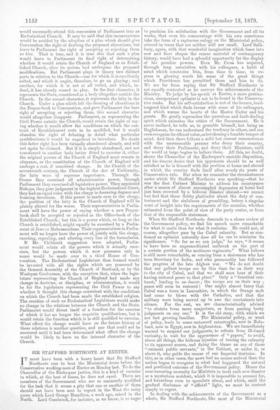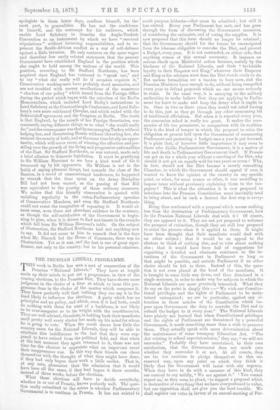SIR STAFFORD NORTHCOTE AT EXETER.
IT must have been with a heavy heart that Sir Stafford Northcote rose to beat the Ministerial drum before the Conservative working-men of Exeter on Monday last. To do the Chancellor of the Exchequer justice, this is a kind of exercise in which, at the best of times, he does not excel. There are members of the Government who are Bo eminently qualified for the task that it seems a pity that one or another of them should not have been sent to repeat in the West the noisy paean which Lord George Hamilton, a week ago, raised in the North. Lord Cranbrook, for instance, as we know, is so eager to proclaim his satisfaction with the Government and all its works, that oven his communings with his own conscience take the form of a rapturous eulogy on the Ministerial policy, uttered in tones that are neither still nor small. Lord Salis- bury, again, with that wonderful imagination which fuses into new and finer shapes the coarse material of contemporary history, would have had a splendid opportunity for the display of his peculiar powers. Even Mr. Cross has acquired, through long association with his colleagues, a habit of mind which constrains him, from time to time, to ex- press in glowing words his sense of the great things which Providence has permitted them and him to do. We are far from saying that Sir Stafford Northcote is not equally contented as he surveys the achievements of the Ministry. To judge by his speech at Exeter, a more pertina- cious, unrepentant optimist is not to be found in the Conserva- tive ranks. But his self-satisfaction is not of the brazen, loud- tongued kind which finds favour with some of his colleagues, and which warms the hearts of the Master Cutler and his guests. He gently reproaches the querulous and fault-finding spirit which animates the critics of the Government. He is never inclined, he tells us, to grumble himself, but being an Englishman, he can understand the tendency in others, and can even recognise its ethical value, as betokening a humble temper of mind. And then there follows a mild but earnest remonstrance with the unreasonable persons who decry their country, and decry their Parliament, and decry their Ministers, until the world at large begins to believe them. All this, no doubt, shows the Chancellor of the Exchequer's amiable disposition, and his sincere desire that his opponents should be as well satisfied as ho is himself with the position at home and abroad in which the country finds itself after nearly six years of Conservative rule. But when we remember the circumstances under which Sir Stafford Northcote was speaking—that he was the first Cabinet Minister to address his countrymen after a season of almost unexampled depression at home had just been crowned by a hideous disaster abroad—we cannot but feel that these flabby platitudes about the duty of con- tentment and the sinfulness of grumbling, betray a singular want of insight into the requirements of the occasion, whether estimated from the point of view of the party orator, or from that of the responsible statesman.
When Sir Stafford Northcote descends to a closer review of the Government policy, we find his speech more remarkable for what it omits than for what it contains. He could not, of course, altogether pass by the Cabul calamity. But so con- firmed an optimist naturally does all he can to minimise its significance. " So far as we can judge," he says, " it seems to have been an unpremeditated outbreak on the part of a certain portion of the mutinous regiments." What follows is still more remarkable, as coming from a statesman who has been Secretary for India, and who presumably has followed the progress of the late Afghan war. " We do not doubt that our gallant troops are by this time far on their way to the city of Cabul, and that we shall soon hear of their having restored peace to that place." Only a "fanatical out- burst," leading to an eineute ; the troops are on their way ; peace will soon be restored 1 One might almost fancy that Cabul was a town in Lancashire, in which the Orange mob had come to blows with the Catholics, and that the military were being moved up to awe the combatants into silence. For the rest, we are characteristically advised " to abstain from mere conjecture, or from passing hasty judgments on any one." It is the old story, with which we are fast growing familiar. The Ministerial policy, or want of policy, leads to some untoward catastrophe, now in Zulu- land, now in Egypt, now in Afghanistan. We are immediately warned to suspend our judgments, to refrain from ill-timed curiosity, to wait for the appearance of " papers," to avoid, above all things, the hideous injustice of tracing the calamity to its apparent source, and fixing the blame on any of those
" eminent public servants," in the Cabinet, or under it, or above it, who guide the course of our Imperial destinies. In this, as in other cases, the news had no sooner arrived than the nation began to recognise in what had happened the natural and predicted outcome of the Government policy. Hence the ever-recurring necessity for Ministers to treat each new disaster as a mysterious accident, which it is impossible to account for, and hazardous even to speculate about, and which, until the gradual disclosure of " official " light, we must be content simply to regret.
In dealing with the achievements of the Government as a whole, Sir Stafford Northcote, like most of the Ministerial apologists in these latter days, confines himself, for the most part, to generalities. He has not the confidence in himself, and the contempt for his audience, which enable Lord Salisbury to describe the Anglo-Turkish Convention as an instrument by which we have " received stipulations " without incurring responsibilities, and to re- present the South-African conflict as a war of self-defence against a Zulu invasion. Ha only ventures on the more vague and therefore less easily refuted statement that the present Government have established England in the position which she ought to hold among the nations of the world. This position, according to Sir Stafford Northcote, has been acquired since England has ventured to " speak out," and to say "what she really will do if occasion requires it." Conservative working-men have probably short memories, and are not troubled with uneasy recollections of the numerous "charters of our policy" which issued from the Foreign Office during the period which began with the rejection of the Berlin Memorandum, which included Lord Derby's instructions to Lord Salisbury at the Constantinople Conference, and Lord Salis- bury's own more celebrated Circular, and which ended with the Schouvaloff agreement and the Congress at Berlin. The truth is that England, by the mouth of her Foreign Secretaries, was constantly saying different things as to what " she would really do ;" and the consequence was that by encouraging Turkey without helping her, and threatening Russia without thwarting her, she secured the enmity of both, and at the same time let slip an oppor- tunity, which will never recur, of winning the affection and pre- siding over the growth of the living and progressive nationalities of the East. Sir Stafford Northcote, as was natural, made only a brief allusion to domestic legislation. It must be gratifying to Sir William Harcourt to see how a kind word of his is treasured up by his opponents. Sir William is not in the habit of saying pleasant things, but towards the close of the Session, in a mood of unaccustomed tenderness, he happened to remark that the time spent on the Army Discipline Bill had not been wasted, as the passing of that Bill was equivalent to the passing of three ordinary measures. We notice that this friendly observation is quoted with unfailing regularity in the extra-Parliamentary speeches of Conservative Members, and even Sir Stafford Northcote could not resist the temptation of repeating it. It would al- most seem, were there not abundant evidence to the contrary, as though the self-satisfaction of the Government is begin- ning to pine, when it is driven to find nutriment in the crumbs which fall from Sir William Harcourt's table. On the subject of Obstruction, Sir Stafford Northeote had not anything new to say. It did not occur to him to remark that in the days when Mr. Disraeli led the House of Commons, there was no Obstruction. Yet so it was, and the fact is one of great signi- ficance, not only to the country, but to his personal admirers.



































 Previous page
Previous page